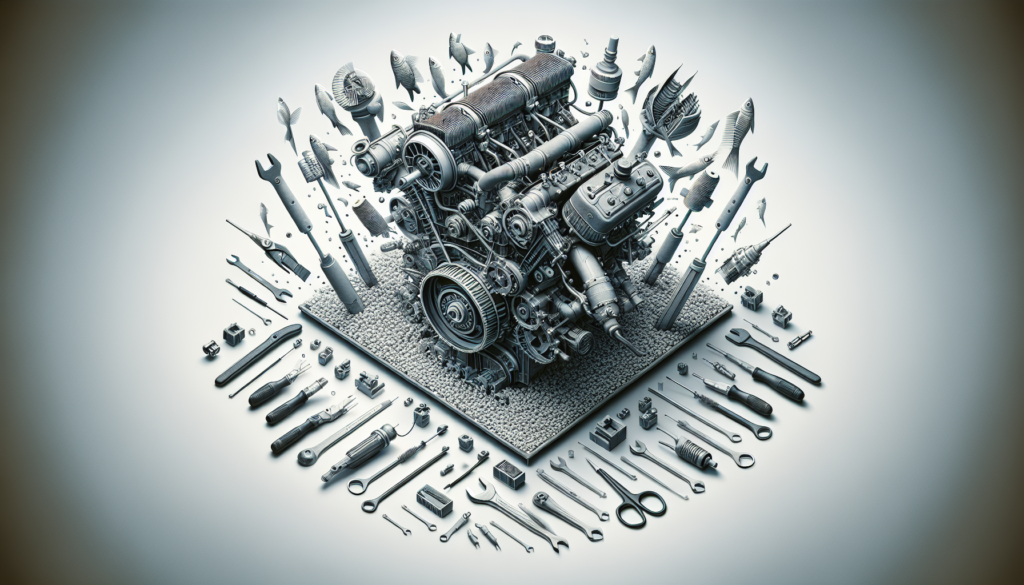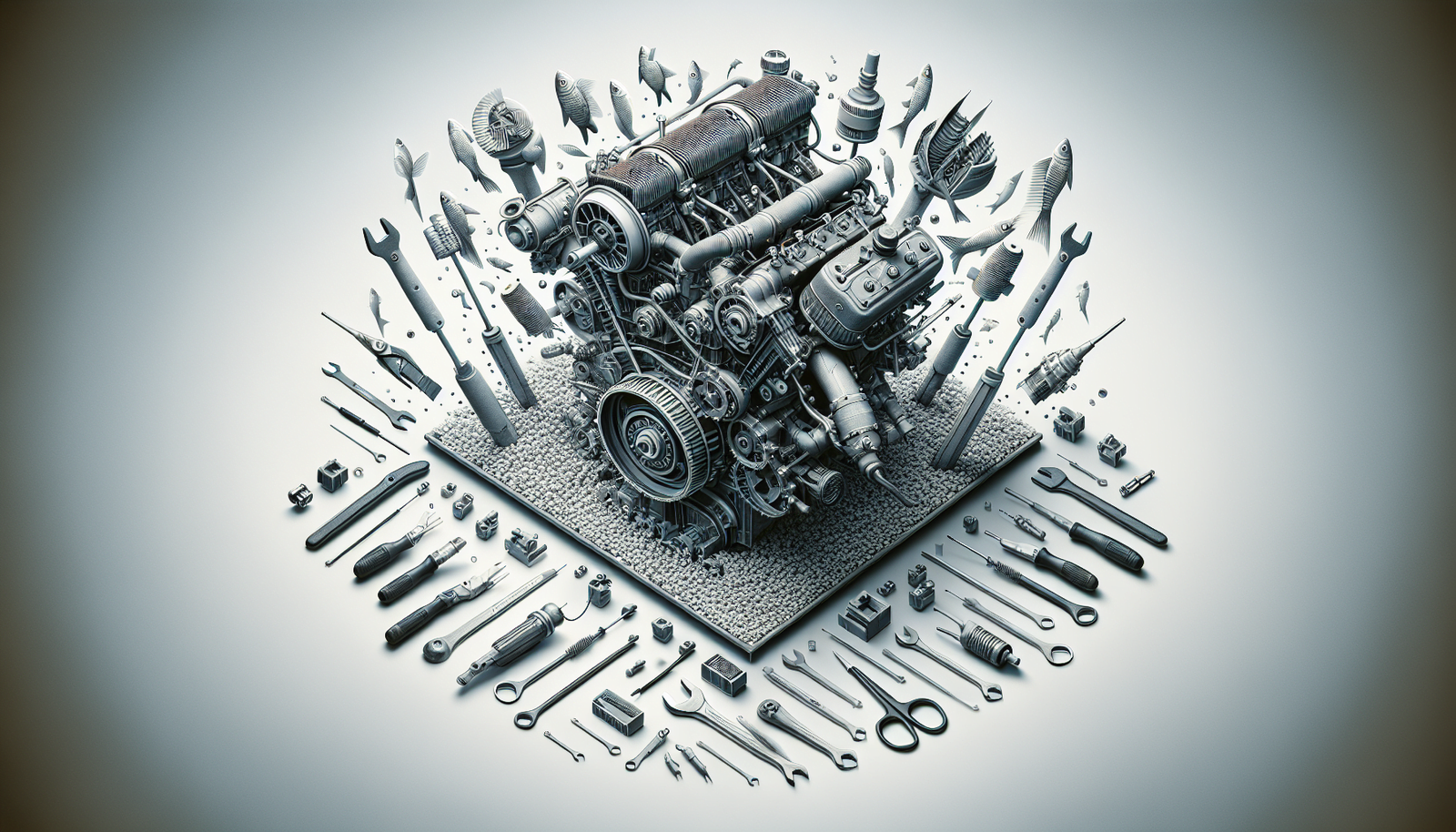You’re out in the serene waters on a sunny day, casting your line and waiting for that victorious tug when suddenly, your boat engine makes an ominous sputter and stalls in the middle of the lake. Panic strikes, but don’t let it ruin your day. This article, “Common Problems and Solutions for Fishing Boat Engines“, is your trusty manual to troubleshoot a range of engine problems. With this guide, you’ll be ready to tackle everything from a faulty alternator to a tricky carburetor. Now, you can stop worrying about your boat’s engine and focus on what truly matters – the catch of the day!
Overheating Issues
Having to deal with an overheating engine can be a nightmare for any boating enthusiast. But understanding the causes and solutions can make the process less daunting.
Causes of engine overheating
Sometimes when you’re out and about enjoying the day on your boat, the engine can overheat. This often occurs when the cooling system is not functioning correctly. Blockages in the cooling system and low coolant levels are frequent causes of this problem. Poor ventilation, worn-out water pump impellers, and contaminated coolant, which can be filled with rust or mineral deposits, can also prompt this issue.
Signs of an overheating boat engine
Fortunately, overheating issues come with noticeable signs. These can include steam coming from your engine, the boat engine switches off suddenly, the temperature gauge reads high, or the engine smelling hot, like burning rubber or metal. If you notice these symptoms, it’s critical to act quickly.
Techniques to prevent engine overheating
Regular preventive maintenance should keep your boat’s engine from overheating. This includes checking the coolant level frequently and replacing it if it’s not sufficient. Ensure the cooling pipes aren’t blocked and the thermostat is working correctly. Another good habit is to let your engine idle a bit before taking it up to speed, allowing it to warm up gradually.
How to fix an overheating boat engine
If your boat’s engine overheats, take immediate steps to cool it down. Stop the engine, open the engine’s hatch for ventilation and to let out the heat. Once cooled off, check the engine for issues like leaks, blockages, or damage. Always consult a professional mechanic if you’re unsure.
Fuel System Problems
Another common problem boat owners face is with the fuel system. It can be quite frustrating, but there are solutions.
Symptoms of fuel system issues
Be on the lookout for unexplained drops in your engine’s performance, rough idling, or your boat engine surprisingly running out of fuel. An unusual smell of gasoline also signals a problem in your fuel system.
Common causes of fuel system problems
These problems often arise due to clogged fuel filters, corroded fuel lines, improper fuel mixture, and water in the fuel can cause significant issues.
Tips for maintaining the fuel system
Keep your fuel system running smoothly with regular maintenance. It includes replacing outdated fuel filters, maintaining the correct fuel mixture, and using a fuel stabilizer to store fuel efficiently. Keeping the tank clean is also necessary to avoid sediment build-up.
Solutions to fuel system problems
When facing fuel system issues, start by checking and cleaning the fuel lines and replacing the fuel filter if needed. Remember to drain the fuel tank and refill it with clean fuel too. If problems persist, call on a professional mechanic.

Oil Leaks
Oil leaks are another issue boat owners may face, and they can hinder your vessel’s performance.
Signs of an engine oil leak
Oil leak symptoms may include oil spots pooling under your boat’s engine, an unidentifiable oily smell, or smoke emitting from the engine’s exhaust.
Effects of oil leaks on engine performance
Oil leaks can cause numerous problems. They can force your engine to work harder, damage engine components over time, and even lead to engine failure.
Causes of engine oil leaks
Oil leaks can arise from worn-out seals and gaskets, corroded oil cooler lines, and damaged oil pans.
Steps for fixing oil leaks
You can fix minor oil leaks by replacing the damaged component causing the leak. For more serious leaks, professional intervention is recommended to avoid further damage.
Starting Problems
Starting problems are among the most common boat engine problems.
Reasons why the engine won’t start
The engine might refuse to start due to issues like a dead battery, a problem with the starter, or insufficient fuel. Also, issues with the ignition system or carburetor can leave you stranded.
Checking for electric issues affecting the start
If the boat’s electrical system faults, it can affect the engine’s start. Regularly inspect the boat’s wiring and fuse box to prevent these issues.
Assessing the fuel system before the start
Before starting your boat, it’s recommended to assess the fuel system to avoid starting problems. This includes checking the fuel level, ensuring that there’s no water in the fuel, and checking the fuel lines.
Steps to resolve starting problems
To resolve starting problems, start by checking the basic components like battery, spark plug, and fuel system. If the issue persists, consider seeking help from a boat engine mechanic.

Propeller Issues
Boat propellers are critical for your boat’s maneuvering and speed. Thus troubleshooting propeller problems is crucial.
Signs of propeller damage
If you notice vibrations while you’re cruising, reduced speed, or poor fuel economy, your propeller might be damaged or out of balance.
Effects of propeller issues on boat performance
Propeller issues can lead to inefficient fuel use, reduced speed, and ultimately damage your engine.
Causes of propeller damages
Propeller damages often occur due to collision with underwater objects, regular wear and tear, and lack of maintenance.
How to fix propeller problems
In many cases, simply replacing a damaged propeller will solve the problem. But for minor dents and scratches, propellers can be professionally repaired and balanced.
Battery Problems
Batteries are the lifeblood of your boat’s electrical system. Having a reliable battery is essential in ensuring your boat runs smoothly.
Symptoms of battery issues
Warning signs for battery problems include a weak or sporadic start, dim lights, or a rapidly draining battery.
Reasons for battery drains
Battery drains can result from a faulty alternator, leaving electrical components switched on when the boat’s not in use, or simply an old and worn-out battery.
Methods to charge a boat battery
You can charge your boat battery using a marine battery charger or trickle charger. Always ensure the battery connections are clean and corrosion-free.
Solutions to common battery problems
Address battery problems by ensuring they’re always fully charged, replacing old batteries, and regularly checking the alternator.
Ignition System Failures
Ignition system failure is another common boat engine problem that can leave you stranded.
Causes of ignition system failure
Ignition failures usually occur due to corroded ignition wires, damaged spark plugs, or problems with the ignition switch.
How to diagnose ignition system problems
The engine not starting is a typical sign of an ignition system problem. If the engine fires up only to stall immediately after or if there’s a misfire, the ignition system might be the culprit.
Effects of ignition system failure on the engine
A faulty ignition system can lead to decreased engine performance, increased fuel consumption, irregular engine operation, engine misfires or it may even prevent the engine from starting altogether.
Solutions for ignition system failures
To address this, you can clean or replace the spark plugs, ignition wires or coil, and the distributor cap and rotor if your system has them.
Engine Stalling
Engine stalling can be both frustrating and dangerous if it occurs while you’re out on the water.
Common causes of engine stalling
Engine stuttering and stalling can be due to a host of issues such poor quality fuel, issues with the fuel delivery system, faults in the engine control unit (ECU) or even a malfunctioning sensor.
Symptoms of engine stalling
Symptoms of engine stalling include the engine cutting out suddenly, loss of power while accelerating, rough idling or the engine not turning over properly.
Effects of stalling on the overall performance
Regular stalling not only disrupts your boating trips but can lead to engine wear out if not addressed, and may even end up damaging your boat’s engine.
Steps to fix engine stalls
A professional mechanic would be well equipped to fix your engine stalls, however, as a first step you can check the integrity of the fuel delivery system, inspect sensors and look for any fault codes in the ECU.
Lack of Power
Power is at the heart of your boating experience. A drop in power can be a sign of an underlying issue.
Signs of lacking power in the boat engine
Signs of power loss in a boat engine can include slow acceleration, inconsistent speeds despite throttle input, excessive smoke from the exhaust, or even a rise in fuel consumption.
Common causes for engine power reduction
Power reduction can be caused by various factors such as poor quality fuel, air or fuel filter blockages, a failing fuel pump, or a fault in the engine’s electronic control unit.
Consequences of operating underpowered engines
Operating an underpowered engine can result in increased strain on the engine, poor fuel economy, and a sluggish and unresponsive throttle.
Solution to regain engine power
To regain lost power, begin by addressing potential fuel and air intake issues. Replace or clean clogged filters, check the turbocharger if your boat has one, and fix any ECU faults.
Corrosion Issues
Lastly, corrosion can damage your boat’s engine if not addressed promptly.
Symptoms of engine corrosion
Corrosion symptoms may include discolouration or rust on engine components, coolant leaks and a decrease in engine performance.
Factors leading to boat engine corrosion
Corrosion primarily happens due to saltwater exposure. However, other factors like humidity, temperature changes, and poor maintenance could also lead to corrosion.
Effects of corrosion on boat engine lifespan
Corrosion can eat away at the engine components and cause extensive damage if not addressed in the due course of time. Ultimately, it can lead to engine failure and shorten the lifespan of your engine.
Methods to prevent and treat engine corrosion
To prevent corrosion, regularly clean and dry your engine, especially after saltwater exposure. Use anti-corrosion sprays and regularly replace worn-out anodes. For existing corrosion, consult a professional as it might require part replacement or intensive cleaning.
Remember, timely maintenance is the backbone of a healthy boat engine. The more you understand your boat engine’s functions and needs, the more likely it is to serve you well on the water.


[…] boat engine problems can be a case of using your senses: listening for unusual noises, looking for visible signs of […]